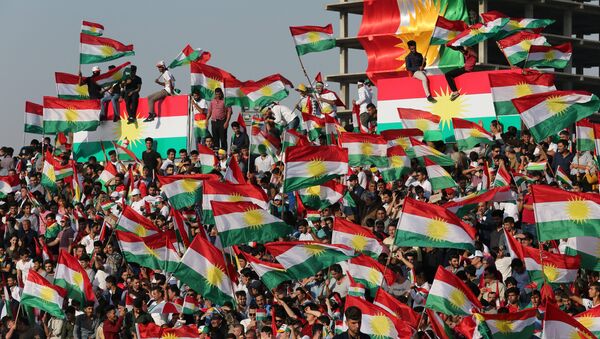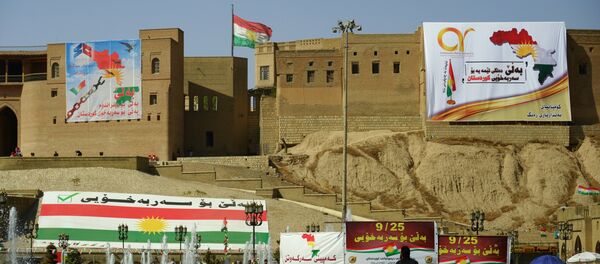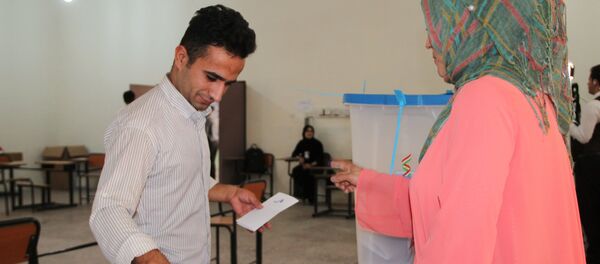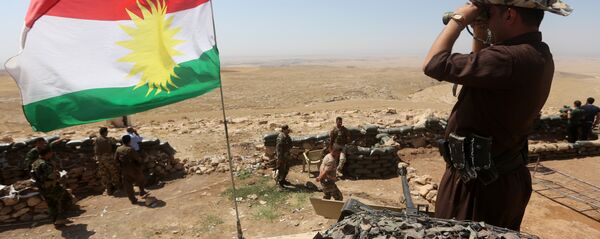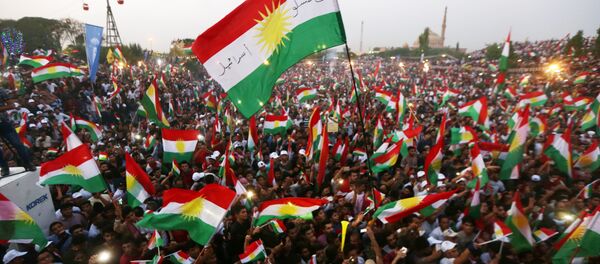MOSCOW (Sputnik) – Iraqi Kurdistan is a northeastern Iraqi region mainly populated by Kurds, which held a referendum on independence on Monday.
The ethno-geographic region of Kurdistan is located in the central part of the Middle East, including parts of Turkey, Syria, Iran and Iraq. The demarcation of the region's precise boundaries remains a complicated issue.
Iraqi Kurdistan is located in the center of ethnic Kurdistan and is the most developed Kurdish region. On March 11, 1974, Iraq passed a law on the proclamation of the Kurdish Autonomous Region.
The administrative boundaries of Iraqi Kurdistan are located in four provinces: the provinces of Erbil, Dohuk, Sulaymaniyah and Halabja.
Iraqi Kurdistan borders on Syria in the west, Iran in the east and Turkey in the north. The 40,600-square-kilometer (over 15,600 square miles) region’s capital is the city of Erbil. Some 5.2 million people lived in the region in 2009.
The average age of the population of Kurdistan is just over 20. A total of 36 percent of the population are under 14 years old, with people aged over 63 years accounting for 4 percent.
Iraqi Kurdistan has all the required state symbols, including its own flag, anthem, constitution, a regional code of laws, a parliament, a president, a government, judicial and tax systems, law enforcement, border control and customs agencies as well as the regional military forces called the Peshmerga Brigades. The regional government successfully implements the multi-vector foreign policy and foreign trade activities.
Masoud Barzani has been the incumbent president of Iraqi Kurdistan since June 2005. Nechirvan Barzani has been serving as the region's prime minister since June 2012.
Oil and gas production is the main and most promising industry in Iraqi Kurdistan, whose oil reserves are estimated at 45 billion barrels.
Local oil accounts for 60 percent of all currently produced Iraqi oil. In 2003, Iraqi Kurdistan announced its right to independently export oil from its territory. In 2004, Erbil and Baghdad signed an agreement on sharing oil sale profits, with Iraqi Kurdistan receiving 17 percent of these profits. Currently, over 45 companies from over 30 countries operate in Iraqi Kurdistan.
In December 2013, Iraqi Kurdistan and Turkey signed an agreement on exporting regional oil and gas. Under the deal, Turkey can purchase 50 percent of Kurdistan's export. The first deliveries under the agreement were made in 2014.
The region has enough water resources and is therefore suitable for agriculture.
In 2005, a modern international airport opened in Sulaymaniyah. In 2009, the second international airport, Hawler, was completed in Erbil, the region’s capital. Over 20 international airlines currently operate in Iraqi Kurdistan.
In 2014, foreign investment in the Iraqi Kurdistan economy was estimated at $5.5 billion, with the United Arab Emirates being the main investor.
The region is considered one of the safest in Iraq, where Daesh terrorist group seized large areas in 2014, when the country was ruled by the then Prime Minister Nouri Maliki.
The Peshmerga paramilitary units are making a substantial contribution to the war against Daesh in Iraq. Between June 2014 and March 2017, about 1,600 Peshmerga soldiers were killed and about 10,000 others were injured while fighting the terrorists.

